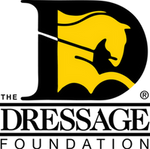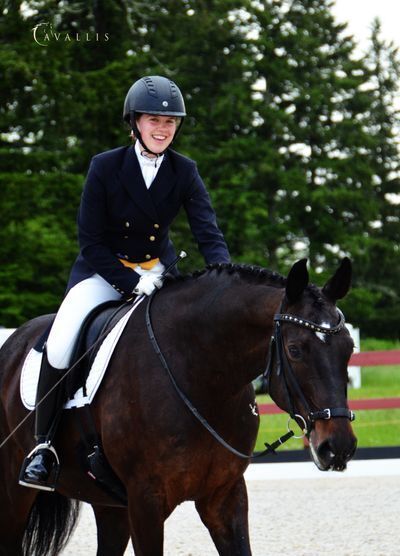
Photo by Siggi Wolff for Cavallis
I am so excited to participate in The Dressage Foundation's 2023 Young Rider Dream Program. This will be my first opportunity to experience top level dressage in Wellington and I believe this week will provide me with invaluable tools and insight for developing a career in the dressage industry. Thank you to The Dressage Foundation and its supporters for this opportunity of a lifetime!
Anna's Day 1 Journal:
Day 1 in Wellington has been amazing! We watched Adrienne Lyle ride and teach this morning at the gorgeous TyL Farm. Adrienne's lessons included her U25 rider, Quinn Iverson, young rider Christian Simonson, and WEG team rider, Katie Duerrhammer. Adrienne rode Betsy Juliano’s 5-year-old, Fürst Dream, who won last year’s US Young Horse Four-Year-Old Championship. We also met Kylee Lourie, owner of TyL, who was super friendly and highlighted the importance of ensuring your horse is in the best training and care program possible. We then had a surprise meet and greet from Debbie McDonald (!!), who highlighted the importance of horse welfare and always loving our horses first. Finally, we chatted with both Adrienne and her sponsor, Betsy Juliano, about what it means to be a sponsor, how to manage rider/sponsor relationships, as well as what it takes to own and manage top-level competition horses.
In the afternoon, we had a long-lining demonstration by Kathy Connelly, at the amazing Top Meadow Farm, who explained some basics of long-lining and teaching the piaffe, as well as highlighting the importance of safety and how to best handle a horse while long-lining.
I need to highlight that everyone we met and chatted with was SO nice. The horse owners, coaches, farm owners, riders, clients, and grooms were all welcoming and down to earth.
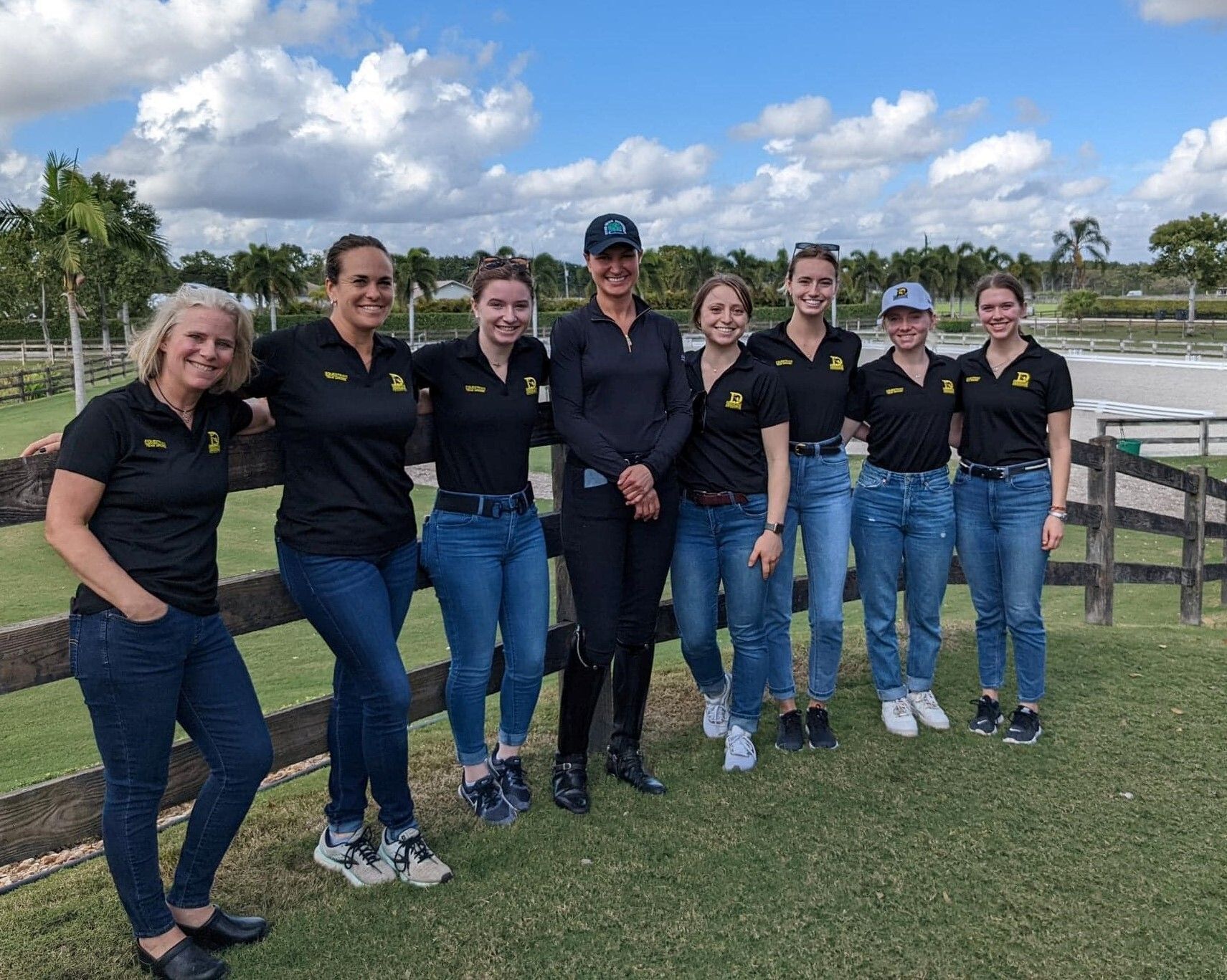
With Adrienne Lyle at TyL Farm, owned by Kylee Lourie
Some of our favorite takeaways are listed below:
With Adrienne Lyle:
- Spend a lot of time working on the walk! Walk halt transitions are a great way to check how straight they are as well as close them up from behind.
- With a younger and less experienced horse, it can be easy to sacrifice your own position and balance in an attempt to compensate for their lack of balance. Don’t do this, rather maintain your own position and core balance and teach them to balance underneath you.
- What is happening with your horse’s mouth is likely what is happening in his brain. Therefore, always strive for a good connection to the mouth. This also applies to horse shopping - look in the video at the quality of the contact and if they have a fussy mouth.
- When investing in a good horse, pick the horse with the movement and temperament that is best for YOU, it may not be the biggest mover/flashiest horse. You hopefully have a coach that you can trust to find the ideal partner.
- Make sure you can ride every part of the horse's body. Can you decide where to put the haunches and shoulders? Can you decide where you want the neck placement? Can you control the stride length in all shapes and movements?
- Young horses have their difficult sides, start with their easier side to make them confident and then work on their more difficult direction/bend.
- Don’t feel like you have to accomplish it all - if the canter is really difficult, see if you can achieve the same goal at the trot. Take the problem and find an easier, calmer, and happier solution.
- Teach baby horses how to learn! They do not need to always be going in the arena. Adrienne and her team spend a lot of time doing groundwork with their young horses and ensuring they have a great relationship and trust first.
- If you have problems with the changes, it likely means you have a more fundamental training issue. Fix the canter first and then work on changes, that way the horse is less confused, and the root of the problem is solved.
- The goal with competitive young horses is to keep them fit without straining their bodies too much. Generally, do a few days in the arena and cross-train the other days.
With Betsy Juliano:
- Betsy selected Adrienne to sponsor as she recognized Adrienne's love for the horses and prioritization of their welfare (as well as her kind character and hard work). As a horse person, prioritize these features as this is what people notice.
- When entering a sponsorship, horse deal, new job, etc., have everything agreed upon early and written in a contract. This will save so many issues down the line and create a better relationship.
- The horse's welfare and happiness comes first. If something does not feel right, listen to your gut and do everything you can to find the answer.
Adrienne, Betsy Juliano, and Debbie McDonald emphasized the importance of knowing your horse, their body, and its emotions super well. You are their advocate and it is your job to speak up and make sure they feel their best and are happy. Loving your horse comes first!
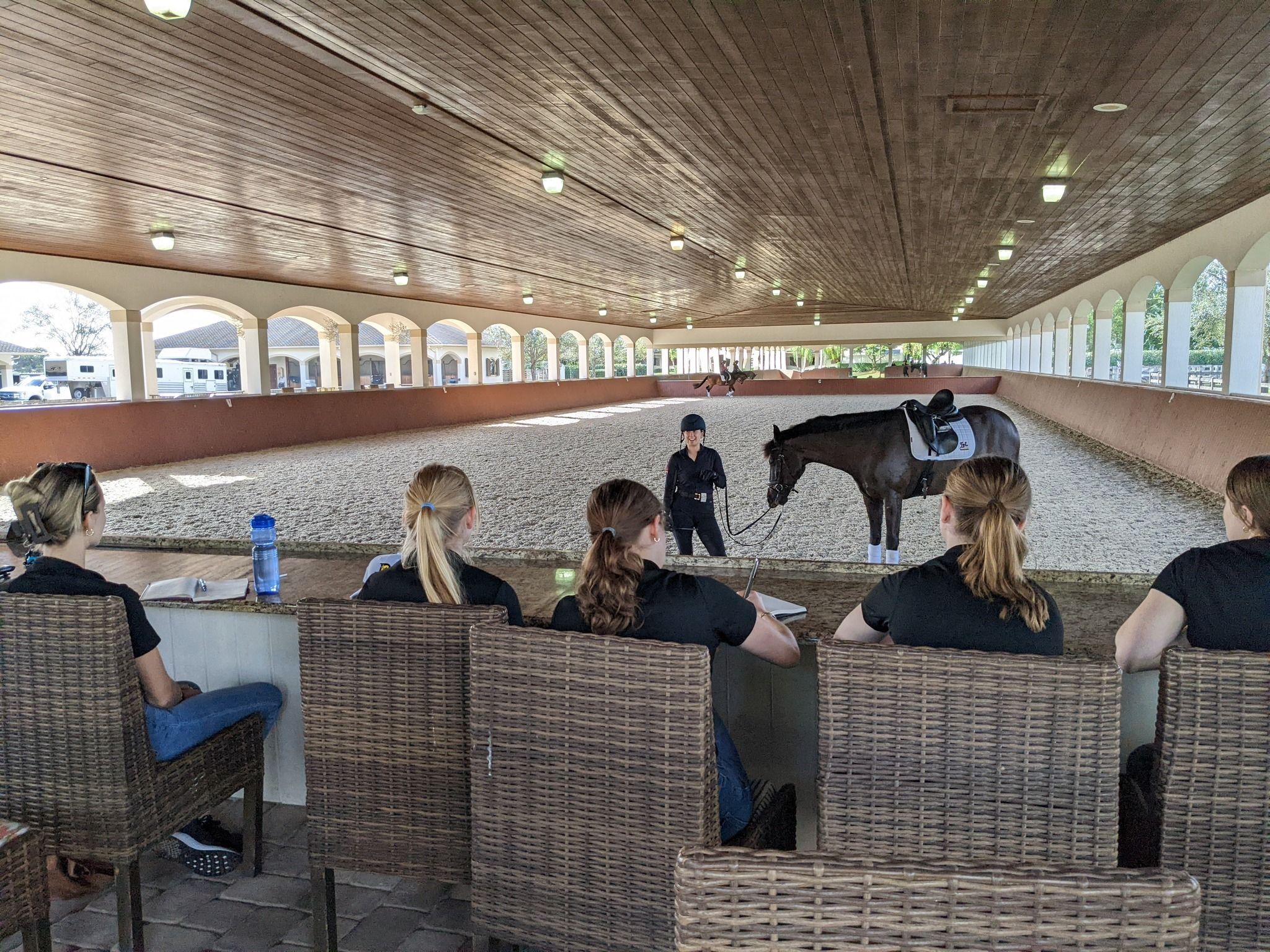
Chatting with Katie Duerrhammer
Long-lining Demonstration with Kathy Connelly:
- Safety when long-lining is the most important. Always keep an eye on their head and keep yourself out of a position to possibly get kicked or tangled in the lines.
- Don’t smack the horse with the whip - use it with a gentle flick of the wrist and on very specific body parts so that the horse can understand what he is doing.
- Long-lining is an amazing tool to teach the horse collection and it makes life easier for the rider - you don’t need to worry about half-halts, riding position, etc., rather you can focus on teaching them how to collect and respond to the whip and forward aids in a very discrete and clear manner.
- Always use a ground person by the horse's head when long-lining and teaching the collection. Their job is to keep the horse on the shoulder-fore.
- Use your horse’s parasympathetic nervous system to your advantage, and find release points on their bodies to help their minds relax.
- When teaching your horse the piaffe by long-lining, you can keep sessions super short and make sure they are always fun and rewarding for the horse.
Dinner with Margaret Duprey:
- Margaret is amazing! A kind woman with a great sense of humor - US dressage is very lucky to be supported by such people.
- You never know where life will take you! Keep working hard and be a good person - things can work out well.
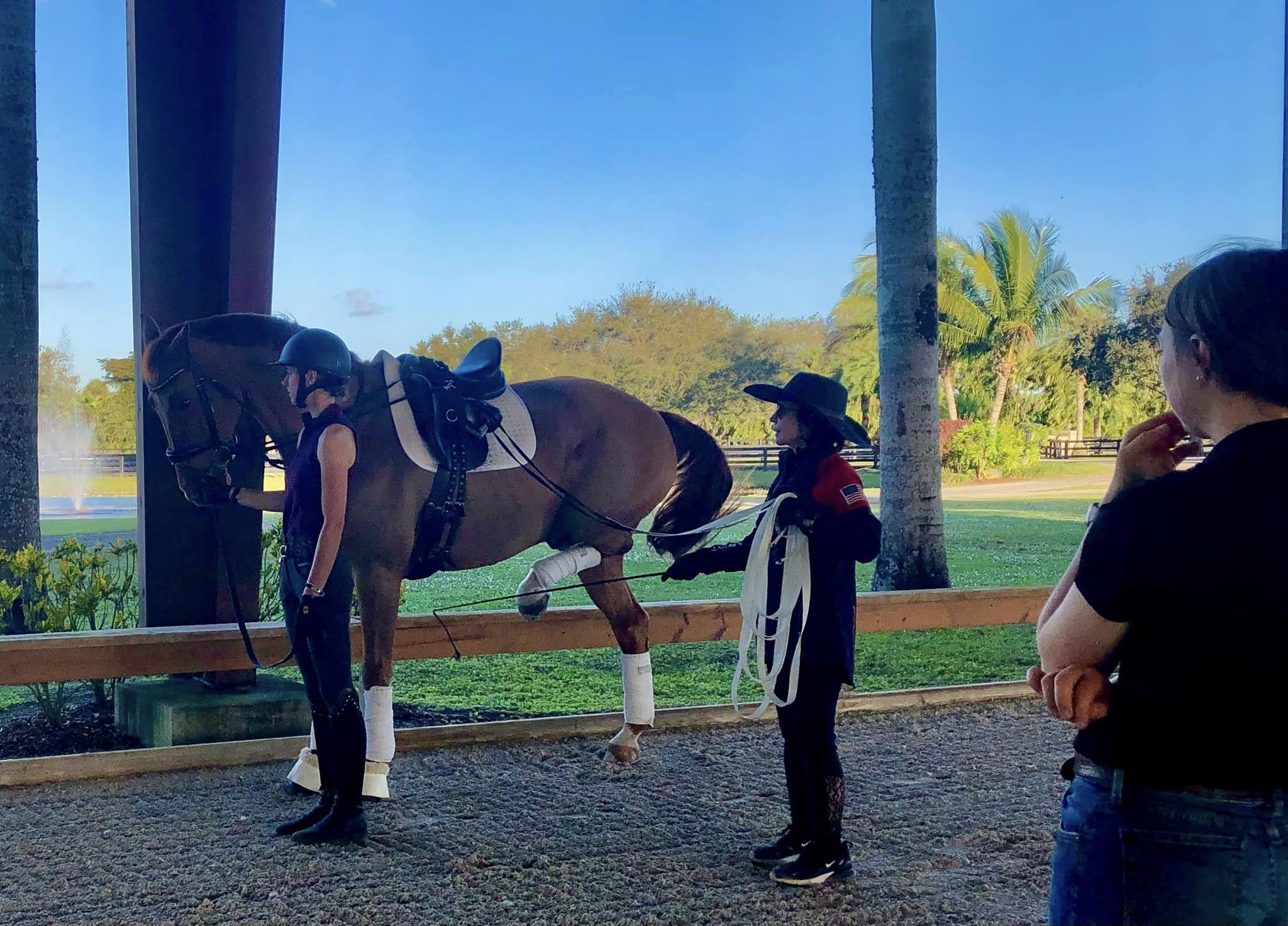
Long-lining demonstration with Kathy Connelly
Anna's Day 2 Journal:
Main takeaways from JJ Tate:
- Have a system for training but approach each horse differently and tailor to their mental and physical needs.
- In the warmup there are 3 F’s
- Free, Forward, Flowing
- Focus more on what am I not doing with my riding and aids rather than focusing only what the horse is doing/not doing.
- Importance of warm up for both young and older horse.
- Rider’s weight can unbalance the horse, the point of the warmup is to rebalance them.
- Find purpose for why you’re riding horses, don’t do it just to win/for glory. Strive to improve every horse, not just to win or make happy owners.
- Take care of your body! Be athletes, go to the physio/chiro/gym to be an athlete too.
- There are three dials when riding:
- Speed, crookedness, inversion (neck and back)
- A supple horse is a strong horse.
- When you have a training problem, always try to break the problem down as much as possible and find the easiest and most simple solution.
- We are the physical therapists and athletic trainers for our horses.
- Importance of making the horse round = the back is the most sensitive part of the body and that is where we sit.
- Treat every horse as a puzzle - what can I learn about you and how can I fix you?
- The tongue is the last muscle on the topline. If you have a tongue problem, you might also have a back and topline issue.
- When we have problems, we often go straight to the hand (we are used to hand eye coordination), instead ride with the leg and the eye or the seat and the eye.
- Ride the “small” trot, keep it slow and simple and teach the horse to balance without running and properly bend their joints.
- Walk canter walk transitions = engagement
- Trot canter trot = build the back up
- There are two kinds of powers = one is carrying and impulsion.
- Own and really ride the three strides before the change. That way the horse really knows what is coming and can prepare balance better.
- The horse's body is the arch of a rainbow and the bit is a pot of gold.
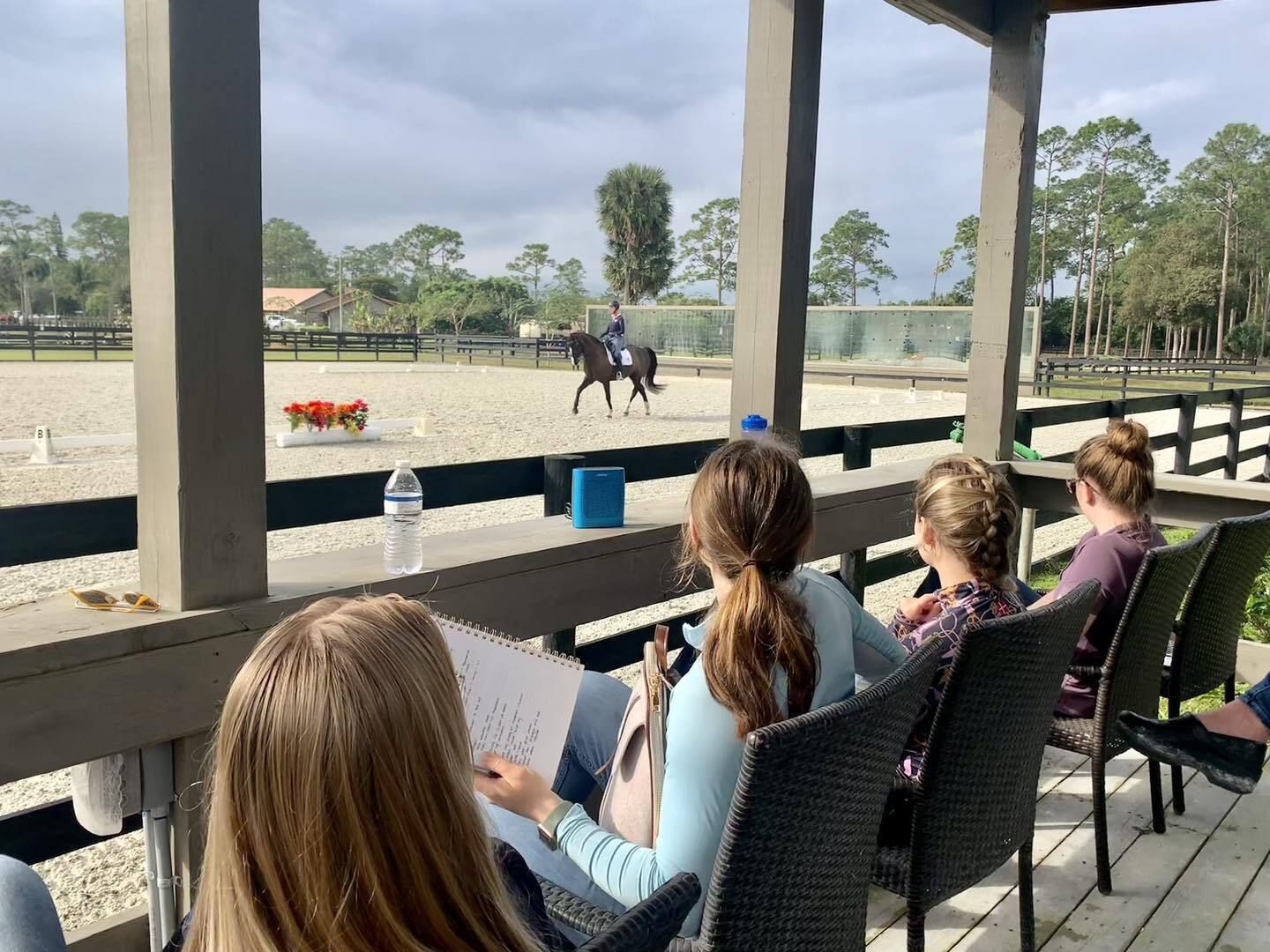
Watching and learning from JJ Tate
Notes from Jane Cleveland, owner of Poinciana Farm:
- Water management and planning are essential when building a farm - definitely make this a priority when building and maintaining your farm.
- Footing is a super important investment.
- Be thoughtful about how you structure your business. Planning and asking questions is very important before launching your business.
Notes from Dr. Hilary Clayton:
Biggest tips:
- Don’t necessarily get the biggest moving or tallest horse - focus on a quality hind leg that steps under and smaller. Slightly more normal looking horses can often last longer and become Grand Prix horses.
- Walk and hack your horse on various surfaces, this is great for legs. This includes hard footing, trail surfaces, fields, etc.
- Turnout is essential! Great for allowing their legs to bend and strengthen.
- Equibands are great for the stabilizing the horse’s spine.
- Dr. Clayton does not personally use boots or wraps - they heat the horse's legs up.
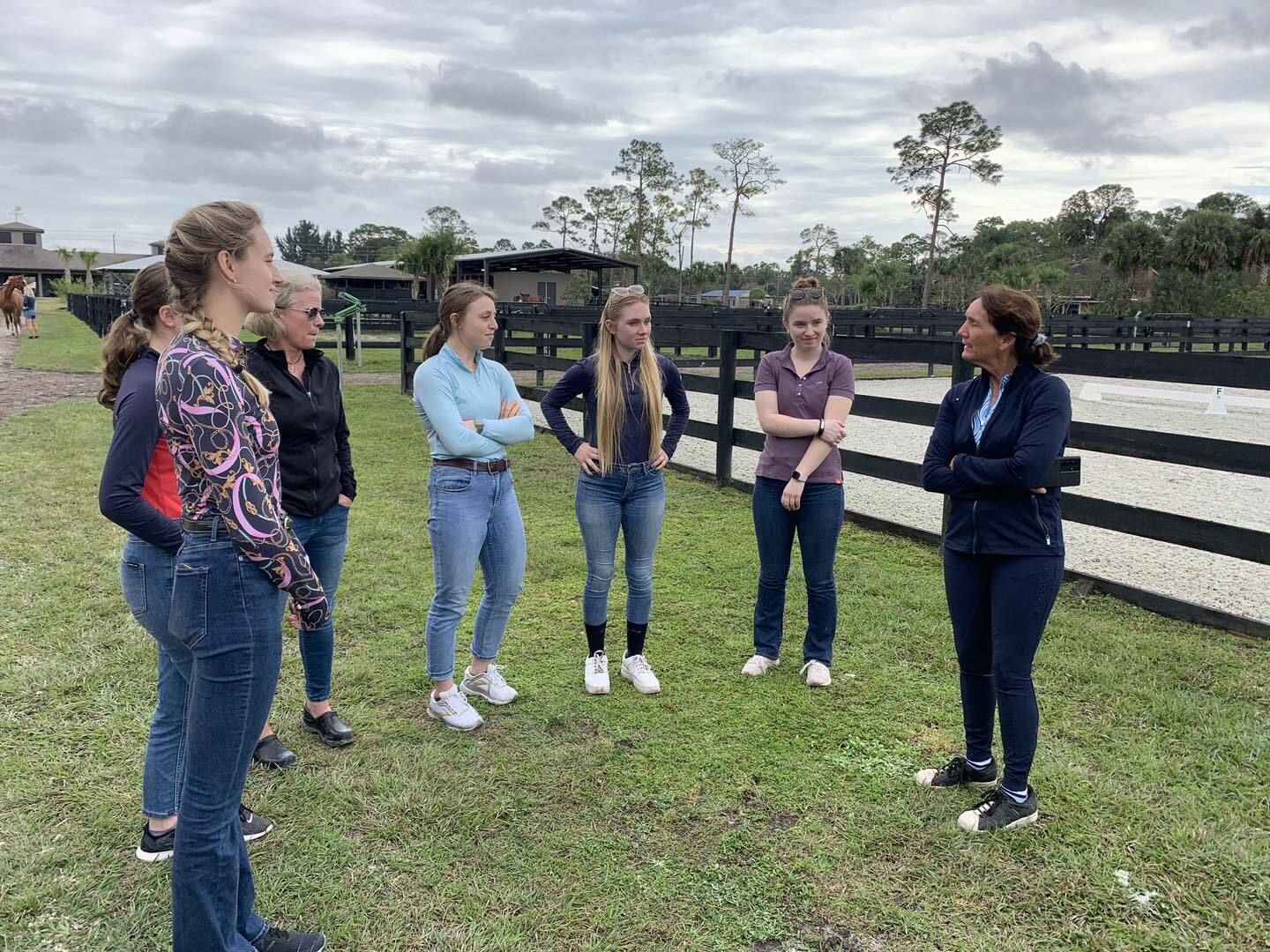
Tour of Poinciana Farm with Jane Cleveland
Anna's Day 3 Journal:
Reese Koffler-Stanfield:
- Know your limits with clients - use the “parking lot” rule. If you get a pit in your stomach when you see their car at the barn, then it is probably not the best fit to work together.
- This sport and business can be very hard emotionally, it’s a good idea to talk to a sports psychologist/therapist to help you navigate big letdowns, difficult situations with peers and clients/sponsors, and even the highs and successes. This is not a sport that you can do alone.
Ali Brock:
- Be persistent in pursuing training and working student opportunities. Just because your desired trainer to work with currently has no openings doesn’t mean they won’t have anything in 6 months, the same goes with looking for a working student position, trying to launch a business, etc.
- Your peers are important! Find a positive and honest core crew to surround yourself with and work with.
- Know your priorities, whether it is in which horses you are training, students who might need the most help at a given time, making your schedule, balancing your personal and working life, etc.
Charlotte Bredahl:
- You never know who is watching! Always put on your best act, ride your horses as well as possible, and have excellent sportsmanship. People notice everything.
- Take advantage of the some of the US dressage pipeline programs - the young horse program and developing team program are incredible resources.
- It is important for coaches to collaborate and work together to improve up-and-coming riders - work with a coach who is willing to collaborate.
- The sport of dressage is moving in an exciting direction in the US! There are many developing quality young horses now and several more riders on the developing, pre-elite list, and elite list than there used to be.
- The Dressage Foundation and USDF/USEF have many grants and aid available - definitely look into these for a leg up.
- You never know where your path will take you - just keep working hard and surround yourself with the right people and things will work in your favor.
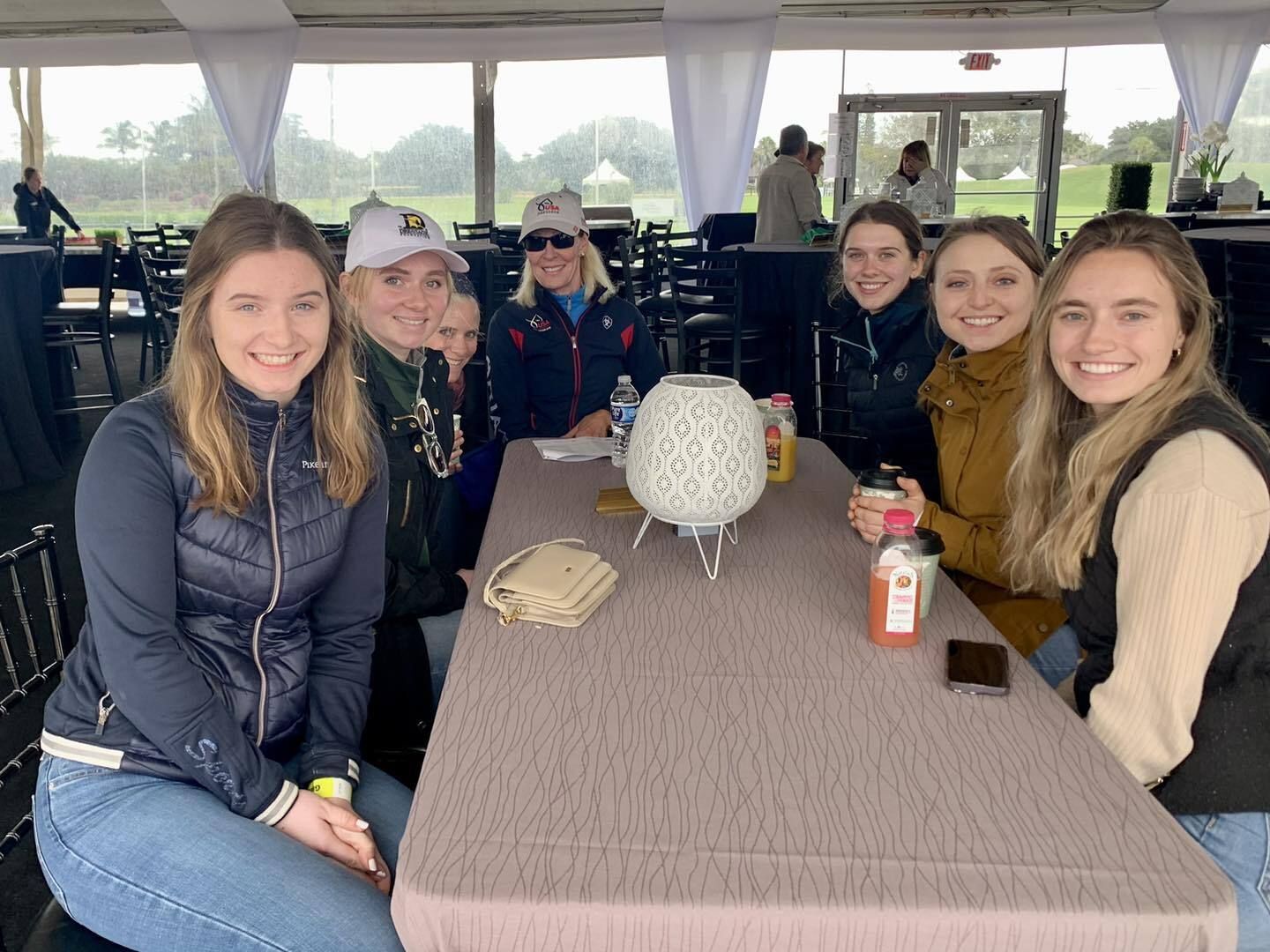
Learning from Charlotte Bredahl at Global
Anna's Day 4 Journal:
Jennifer Williams:
- Walk breaks while working in the arena should still be “working”, practice the extended walk, transitions in the walk, halts, etc.
- Teach horses to drop the neck when responding to pressure. This helps keep them relaxed and keep them safe. This starts all with groundwork and simply teaching them to drop their head when you apply pressure to the reins or lead rope.
- Rather than expecting submission from a horse who might be difficult, focus on building confidence within a training system. This will make them happier and less confused.
- Make your horses rideable for all - your mom should be able to get on and ride them!
- When you shorten the walk and pick up the reins, they need to think of activating their hind legs rather than stopping.
- The basics are huge! Groundwork is a great way to practice and confirm the basics.
- NEVER ride backwards with your arms and hands. Use your seat and make them softer in the neck from your wrists only.
The "Bills" - Judges Bill Warren and Bill McMullin:
- Take time while developing your career to invest in your own education - do not become tied down with too many of your own clients/horses/a farm. Be able to go to Florida or Europe or your favorite trainer to invest in your education.
- Judges want to see an overall picture of harmony - you can make nice movements, but a lack of harmony and connection between horse and rider will be reflected in the score.
- Strive to ensure your horse has a quiet and happy mouth! Open and/or thrashing mouths drive judges crazy!
- The judges education program and trainer certification program are both awesome and super helpful in a trainers career.
- Build a great clientele that will stay with you - you don’t have to work with the clients you don’t love.
- Judges want to give you great marks and help you become better. Don’t see them as someone scary or who is against you - we can confirm that “The Bills” and Charlotte Bredahl (former judge), are super nice and supportive people!
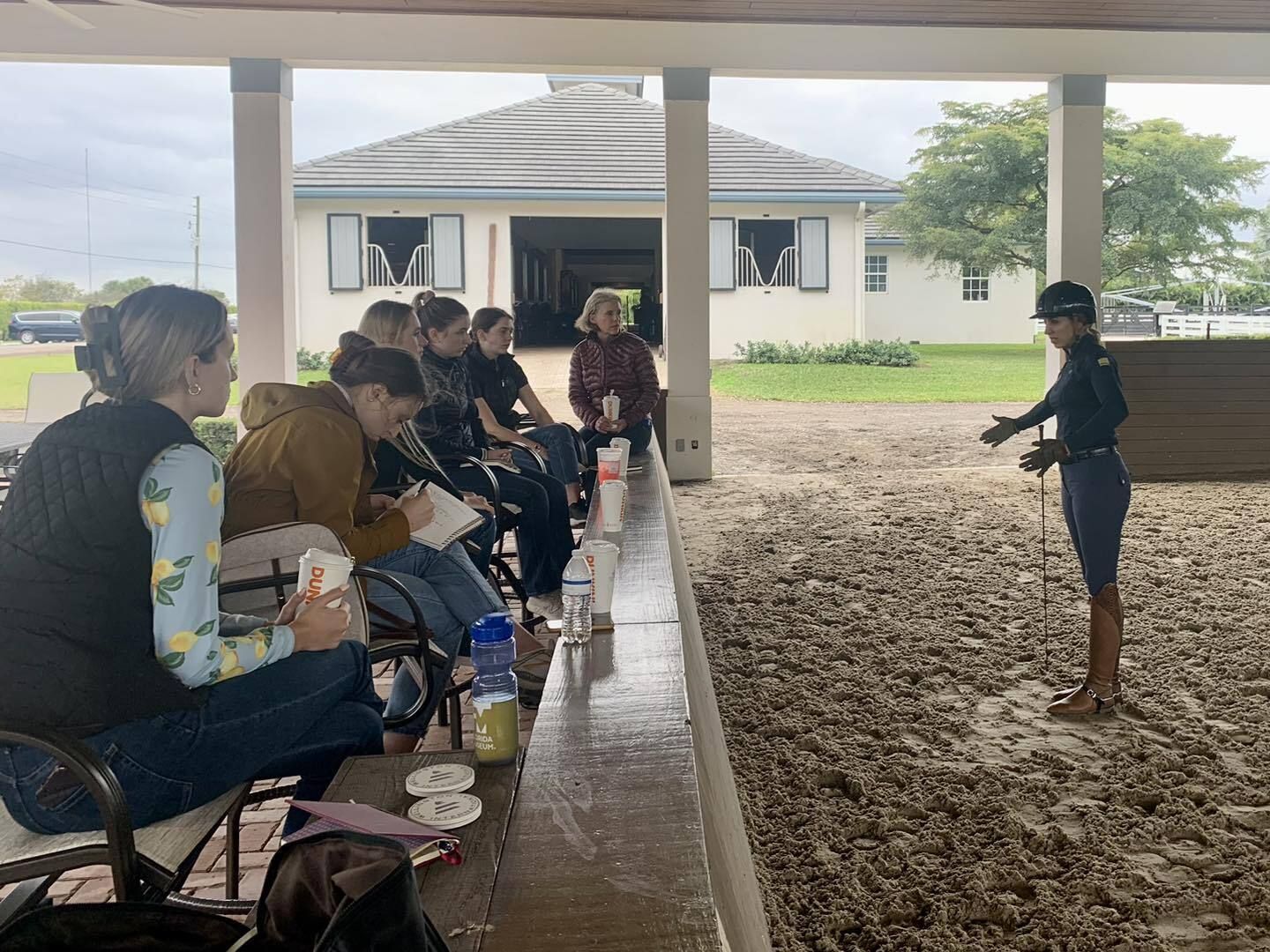
With Jennifer Williams
Anna's Wrap-Up
Our Dream Trip week in Wellington was incredible - everyone we met with was so friendly, knowledgeable, and generous with their time (we asked a LOT of questions!). During the four-day trip, we met with some of the top professionals in the dressage industry including riders, sponsors, barn owners, judges, and vets. All of these professionals shared their own experiences and advice, and each stressed the importance of developing a bond with your horses and focusing on their welfare and happiness above everything else. A few of my trip highlights include meeting with Adrienne Lyle and Betsy Juliano, watching the Friday Night Lights freestyles at the Adequan Global Dressage Festival, and attending dinner with the amazing Dr. Hilary Clayton.
I am so motivated to apply everything I've learned to my own training and horse management. While becoming a professional rider is a difficult journey, this trip showed us what is possible if you work hard, treat your horses well, and surround yourself with positive people. The standard of riding and horse care that we witnessed has also helped me focus more on my training and understand how I need to cross-train and care for my competition horse.
Our Dream Trip group of girls and chaperones, Eliza Sydnor Romm and Jen Verharen became so close during our time in Wellington! We shared so many laughs and really bonded over our experiences and shared riding and training goals - these people really made the trip a special experience.
Thank you so much to the Dressage Foundation and donors for making this program possible. This is an amazing opportunity for young riders who are hoping to become professionals and I highly encourage young riders to apply and embark on this amazing learning experience!
